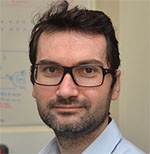Cost: £1,500
Book a place
Overview
Short course/CPD module providing the fundamental technical details of how to design a data centre network.
It covers:
- switch technologies and architectures
- network protocols
- topologies and interconnects
- advance solutions for future systems
You'll also learn about edge computing from recent technical research papers and hands-on python-based labs.
The course is run by UCL's Department of Electronic and Electrical Engineering.
Who this course is for
This course is suitable for researchers, engineers, IT professionals and managers working in industry.
It's particularly suited to graduates in electronic and electrical engineering, physics, communications engineering and computer science who want to further their knowledge on a particular topic, or work towards a Master's degree.
You don't need to have any pre-requisite qualifications to take this course.
Course content
Part A: Cloud data centre network infrastructure
The first part of the course focuses on the technical details of data centres network systems in use today, as well as advanced technologies.
Topics covered include:
- Network architectures for data centre farms, modular, rack-scale and performance optimised data centres
- Network traffic characteristics
- Key performance metrics for data centre interconnects and state of the art technologies
- Cloud data centre and high performance computing (HPC) network protocols with focus on Fibre Channel and InfiniBand
- Switch architectures (e.g. cross-bar, Clos)
- Cloud data centre and HPC network topologies (e.g. tree, torus, hypercubes) and associated routing
- Advanced network architectures, technologies and optical interconnects
Part B: Edge-cloud and edge-/fog-computing architecture
The second part of the course explores research into edge and fog computing. You'll also work with a simulation tool in a computer lab environment.
Topics covered include:
- Introduction to edge-cloud and fog-computing
- Challenges for edge- and fog-computing architectures
- From distributed storage to distributed computation systems
- Resource allocation in edge-computing clouds
- Security and privacy in edge- and fog-computing environments
- Cluster and datacenter schedulers
- Hadhoop and MapReduce
- Mobile edge cloud and low-delay services
- Applications and application requirements in the internet of things era
Dates, assessment and certificates
Classes will be held from 2pm to 6pm on Mondays, over 8 weeks.
Teaching will take place in person with some materials available online.
The course is assessed through an exam.
If you complete the course but not the exam, you'll receive a certificate of attendance.
If you take and pass the exam you'll get a certificate stating this, which includes your pass level.
Benefits of UCL's Electronics and Electrical Engineering CPD courses
You can take this course as a standalone (one-off) course/module, or accumulate it towards an MSc qualification (up to two standalone modules can be transferred towards the flexible MSc degree).
Benefits to employees
The programme offers the opportunity for professional people working in the telecommunications industry to develop their career, be able to respond to changes in their environment, and learn while they earn. It's also designed to give you the opportunity of working towards an MSc qualification from an academic institution whose quality is recognised world-wide.
Benefits to employers
Our flexible CPD courses enhance staff motivation and assists in the recruitment and retention of high-quality staff. It enables your company to keep ahead of the competition by tapping into world-leading research, and to profit from UCL's world class Telecommunications and Business expertise.
View the full range of related courses available.
Learning outcomes
On completion of this course, you should be able to:
- identify and describe the key features of data centres and their network, including their history and role in society and economy
- understand, compare and apply various topologies to solve particular real-world problems via use-cases
- explain InfiniBand protocol and its layers and fabric building, and be able to design an end-to-end network
- design and apply crossbar and clos-based switches to deliver a certain level of blocking probability
- design and apply optical fibre interconnect technologies to solve fibre density and data transport problems
- understand principles of edge and fog computing
- understand the concept of trusted execution environments and lightweight virtualisation environments
- design resource allocation algorithms for edge-computing
- understand security challenges in edge-computing
- appreciate future technological trends across all aspects of data centers and edge-computing
Course team

Dr Georgios Zervas
Georgios is Associate Professor in the Department of Electronic and Electrical Engineering. His research interests include optical network technologies and control, data centres and high performance computing, software/hardware defined networks, and reconfigurable computing and programmable hardware.

Dr Ioannis Psaras
Ioannis is a Lecturer in the Department of Electronic and Electrical Engineering. His research focuses on computer communications and internetworking. His interests are in the areas of internet routing and congestion control, information-centric networks, software-defined networks, mobile crowdsourcing and mobile, opportunistic and delay-/disruption-tolerant networks.
Book a place
Course information last modified: 20 Jul 2024, 00:07
 Close
Close

